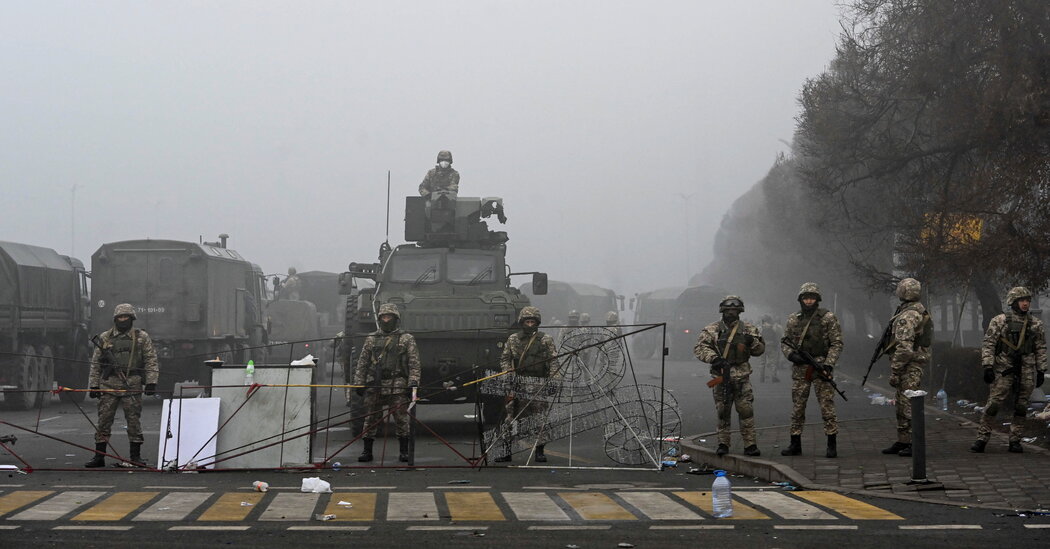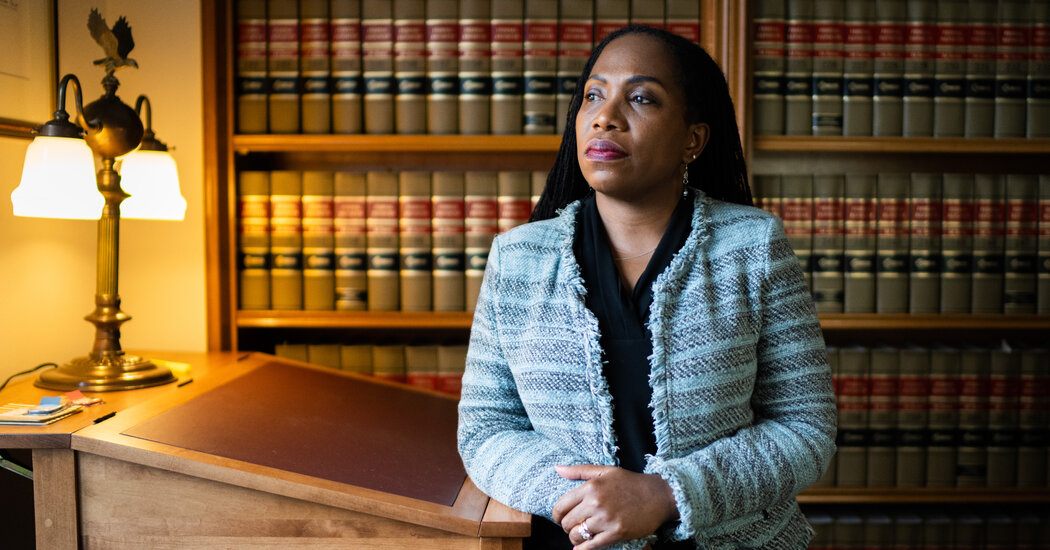
Long adept at stoking unrest in the West, President Vladimir V. Putin of Russia sent troops to the Central Asian nation of Kazakhstan on Thursday to try to extinguish the latest in a series of dangerous fires to engulf the lands of the former Soviet Union, territory that Moscow views as its own sphere of influence but has struggled to keep calm.
But if the turmoil in Kazakhstan has once again exposed the vulnerability of the strongman leaders the Kremlin has trusted to keep order, it has also presented Russia with yet another opportunity to reassert its influence in its former Soviet domain, one of Mr. Putin’s most cherished long-term goals.
The arrival in Kazakhstan of 2,500 troops from a Russian-led military alliance amid continuing spasms of violent protest was the fourth time in just two years that Moscow has flexed its muscle in neighboring states — Belarus, Armenia and Ukraine being the other three — that the West has long tried to woo.
The spectacle of a country like Kazakhstan “that seems big and strong” falling into disarray so quickly has come as a shock, said Maxim Suchkov, acting director of the Institute for International Studies at the Moscow State Institute of International Relations. But it has also shown how, with the exception of Ukraine, in the former Soviet republics that have tried to balance between East and West, “boom, you get a crisis and they turn to Russia.”
And once Russian troops arrive, they seldom, if ever, go home. Mr. Suchkov said that the unrest in Kazakhstan can be seen as a “serious crisis that Russia is interested in turning into an opportunity.”
Yet, many question how many brush fires can spring up around Russia’s borders before a similar conflagration is ignited at home.
“If something like this can happen in Kazakhstan,” said Scott Horton, a law lecturer at Columbia University who has advised officials in Kazakhstan and other Central Asian countries over two decades, “it can certainly happen in Russia, too.”
Other analysts say that as much as Mr. Putin delights at unrest in Europe and the United States as evidence that democracy is failing, he takes little pleasure in turmoil on Russia’s own doorstep, no matter what the short-term opportunity.
All the same, Mr. Horton said, “Putin is playing, or perhaps overplaying, a weak hand very well.”
It wouldn’t be the first time.
After offering in August 2020 to provide what he called “comprehensive assistance” to help President Aleksandr G. Lukashenko of neighboring Belarus halt a wave of huge protests, Mr. Putin then sent “peacekeepers” to stop a vicious war over disputed territory between Armenia and Azerbaijan. Russia has stationed more than 100,000 troops on its border with Ukraine to press demands that Kyiv abandon its yearslong flirtation with NATO.
Among the soldiers sent to Kazakhstan were members of the 45th Brigade, an elite Spetsnaz, or special forces, unit infamous for its operations in the first and second wars in Chechnya, the once restive but now brutally pacified Caucasus region of Russia. The brigade has also been active in South Ossetia, a region of Georgia at the center of that country’s 2008 war with Russia; in Crimea, which Russia annexed in 2014; and in Syria.
How much this assertive role really contributes to Mr. Putin’s longstanding goal of restoring Russian dominance over much of the former Soviet sphere is a matter of heated debate.
In Ukraine, it has mainly achieved the opposite, turning what had been a generally Russia-friendly population in large parts of the country into a sworn enemy. It has also set nerves on edge outside the former Soviet space and played into the hands of anti-Russian hawks, reviving a previously dormant debate in Sweden and Finland about whether they should join or at least more closely associate with NATO.
When Kazakhstan bolted from the Soviet Union three decades ago, it held the world’s fourth-biggest stock of nuclear weapons, vast reserves of oil and so much promise and peril that Secretary of States James A. Baker III, rushed to the new country to try to cement ties by drinking vodka with its leader, Nursultan Nazarbayev, in the sauna and accepting blows from a tree branch.
“Get me the president of the United States on the phone,” the American ambassador to Moscow at the time, Robert S. Strauss, who was also there, joked to the security detail. “His secretary of state is buck naked, and he’s being beaten by the president of Kazakhstan.”
Since then, Kazakhstan has given up its nuclear arms, welcomed American energy giants like Chevron and Exxon Mobil to develop its oil fields and become such a trusted partner that, in a message to its current leader last September, President Biden told President Kassym-Jomart Tokayev that “the United States is proud to call your country a friend.”
Throughout, however, people have been beaten, not just playfully in the sauna but viciously in detention centers and on the street. While its record of repression may be less severe than in other former Soviet republics in Central Asia, like Turkmenistan and Uzbekistan, according to Amnesty International, it does include widespread “torture and other ill treatment in penitentiary institutions.”
But in the post-Soviet revival of the Great Game, the 19th-century struggle between colonial powers across Central Asia, human rights have never been a particularly important factor in the calculations of the United States — and even less so in those of its main competitors in the region, Russia and, over the past decade, China.
Understand the Protests in Kazakhstan
For Mukhtar Ablyazov, a Kazakh tycoon who fled into exile after falling out with his former patron, Mr. Nazarbayev, the current wave of protests and the Kazakh government’s appeal to Moscow for military help to crush them is proof that the West miscalculated and handed Russia a big win.
Kazakhstan, he said on Thursday as Russian troops deployed, succeeded in “putting the international community to sleep” with promises of big contracts. “The result: Kazakhstan is now under the boot of Putin, who takes advantage of this to extend his power.”
Steve LeVine, the author of “The Oil and The Glory,” a chronicle of the struggle between Moscow and Washington in the region after the collapse of communism, said America’s understanding of Kazakhstan in its early years as an independent state was “almost entirely” through the Tengiz oil fields.
But, he added, Kazakhstan still developed into a far more stable, prosperous and tolerant country than its neighbors. “Kazakhstan is not a democracy, but it is a Central Asian democracy,” he said. “The region is run by strongmen.”
Such leaders, to Mr. Putin’s dismay, have proved surprisingly brittle, a fact that has repeatedly confronted the Kremlin along its borders with eruptions of the kind of discontent it has sought to keep bottled up at home. But their weakness has also made Mr. Putin the indispensable protector that they turn to in times of crisis.
Alexander Cooley, a professor of political science at Barnard College and an authority on Central Asia, said that Russia is unlikely to demand immediate concessions from President Tokayev but has gained strong leverage, upsetting Kazakhstan’s previous efforts to avoid tilting too far toward either Moscow or Washington.
“Kazakhstan always tried to maintain a balancing act,” he said. “This is all about regime survival. State security needs have been reconfigured to fit the needs of those in power.”
The Kazakh authorities say that dozens of protesters have died in the unrest so far with many more injured, and that 18 security officers have been killed. If the clashes drag on, the Kremlin could wind up alienating a broad swath of the Kazakh population, which in large cities like Almaty often speaks Russian and had been relatively pro-Russian. That would repeat the scenario in Ukraine, where anti-Russian sentiment has become so strong it is unlikely to subside for years or decades.
But Mr. Tokayev, who took over as president in 2019 from Mr. Nazarbayev, the leader Mr. Baker joined in the sauna, is now beholden to Russia both for support in suppressing protesters and in removing Mr. Nazarbayev from his last post as head of the National Security Council on Wednesday. Such assistance is seldom offered free of charge, particularly not by as canny a tactician as Mr. Putin.
Valerie Hopkins in Moscow and Andrew Kramer in Kyiv contributed reporting.




